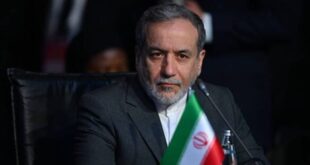 TEHRAN (AP) — Adamant not to budge under pressure, Iran on Sunday announced new short-range missile tests, and President Mahmoud Ahmadinejad dismissed criticism that new UN Security Council sanctions were hurting the economy.
TEHRAN (AP) — Adamant not to budge under pressure, Iran on Sunday announced new short-range missile tests, and President Mahmoud Ahmadinejad dismissed criticism that new UN Security Council sanctions were hurting the economy.
The missile tests come days after the United States said it would deploy a second aircraft carrier to the volatile Gulf, the USS John C. Stennis. US military officials have said the carrier, which is set to arrive in Mideast waters in a matter of weeks, was meant as a plain warning to Iran.
The deployment appeared to alarm some in Iran’s leadership, including a member of a powerful cleric-run body who last week warned that Washington plans to attack Iran in the coming months, possibly by striking its nuclear facilities.
US officials have long refused to rule out any options against Iran but said military action would be a last resort.
Iranian state-run television reported the elite Revolutionary Guards planned to begin three days of missile tests near Garmsar city, located in northern Iran about 100 kilometres southeast of Tehran. The military manoeuvre, which would test the short-range Zalzal and Fajr-5 missiles, was set to begin Sunday, the broadcast said. It could not immediately be confirmed if the missile tests began.
“The manoeuvre is aimed at evaluating defensive and fighting capabilities of the missiles,” state-run television quoted an unnamed commander of the guards as saying.
Last year, Iran held three large-scale military exercises, testing what it called an “ultra-horizon” missile and the Fajr-3 missile, which reportedly can evade radar and use multiple warheads to hit several targets simultaneously.
While the Zalzal is a solid fuel missile, the Fajr-5 missile, from the Persian word meaning dawn, is an artillery rocket developed by Iran in early 2006. It includes a mobile platform and its primary role is to engage land targets, with a range of 75 kilometres. Though US officials have suggested that Iran has exaggerated the capabilities of its newly developed weapons, Washington and its allies have been watching the country’s progress in missile technology with concern. The US — which led manoeuvres of its own in the Gulf in October — accuses Iran of backing armed groups fuelling Iraq’s sectarian violence and has tried to rally its Arab allies in isolating Tehran.
Iran’s latest military manoeuvres also are the first since the Security Council imposed sanctions last month on it over its refusal to suspend nuclear uranium enrichment. The sanctions ban selling materials and technology that could be used in Iran’s nuclear and missile programmes and freezing assets abroad of 10 Iranian prominent companies and individuals.
The United States and its allies accuse Iran of secretly developing atomic weapons — a charge Tehran repeatedly denies, saying its programme is solely for peaceful purposes.
A top American diplomat urged Iran on Sunday to resume negotiations on curbing its nuclear programme, warning of stepped-up international pressure if diplomacy fails.
Speaking in Israel, Undersecretary of State Nicholas Burns said the limited UN sanctions imposed were just the beginning of the global effort to punish the Tehran regime.
“Iran is going to have to suffer the consequences of being an international pariah,” he said.
Ahmadinejad has remained defiant, refusing to buckle under pressure by agreeing to suspend uranium enrichment, a process that can produce material to fuel nuclear reactors or provide fuel for bombs.
But his tough talk has come under criticism from both ends of Iran’s political spectrum. Some reformists and conservatives have accused the president of focusing too much on fiery anti-Western rhetoric and not enough on domestic issues including Iran’s economy.
The president on Sunday defended his economic policies, saying the sanctions would never deter Iran from pursuing its nuclear programme.
“The [UN] resolution was delivered dead. Ten more similar resolutions will not affect our economy and our policy,” Ahmadinejad said in a speech broadcast live on state-run television as he delivered the budget for the new year.
“Falsely, they want to imply that we have had costs in this regard,” the president said — an apparent reference to recent news stories in the West that prices of food and other basics have risen in Iran since the sanctions were imposed in late December.
The inflation has hit Iranians hard, as has unemployment, which the government puts at 10 per cent, but independent Iranian economists say could be as high as 30 per cent. The government also says inflation is around 11 per cent, but experts estimate it at 30 per cent.
Ahmadinejad was elected last year on a populist agenda promising to bring oil revenues to every family, eradicate poverty and tackle unemployment, but he has faced increasingly fierce criticism in recent weeks for his failure to meet those promises.
In presenting his budget for the year that begins March 21, the president defended his domestic and economic policies.
“The government has completely controlled the prices of some food stuffs, such as bread, gas, water and electricity,” he said.
About 150 Iranian lawmakers have signed a letter calling on Ahmadinejad’s government to reconsider its draft budget for next year, because they believed the draft was too dependent on oil revenues. Roughly 80 per cent of Iran’s revenues come from oil exports.
Ahmadinejad said Sunday the budget bill was prepared to compensate for a possible drop in oil prices, but he gave no specifics.
“We assume enemies want to damage us by decreasing the price of oil,” he said. “So, we have reduced dependency on oil revenue.”
 Eurasia Press & News
Eurasia Press & News



